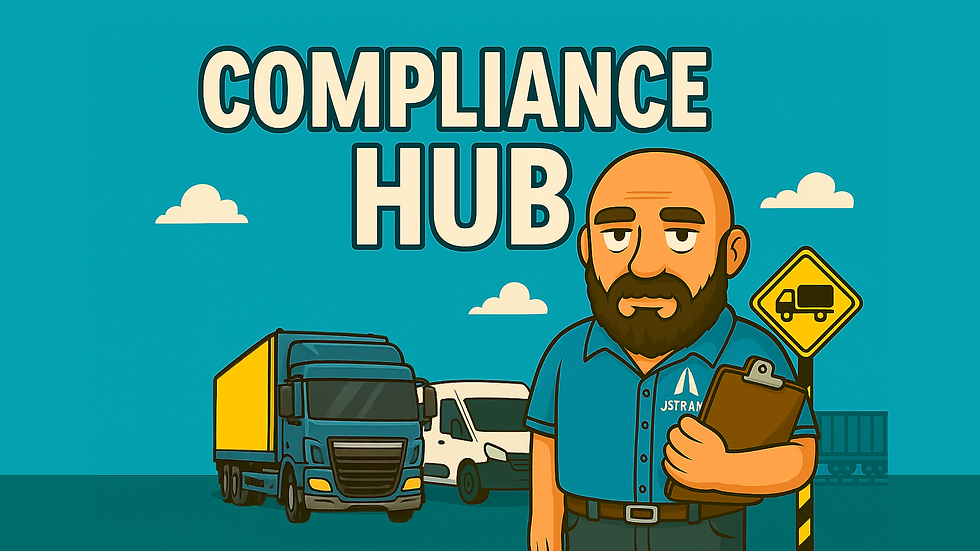What Happens at a Public Inquiry for a Restricted Licence Holder?
- stuart47304
- Jul 14, 2025
- 4 min read

For most Restricted Licence holders, the thought of a Public Inquiry is enough to cause a sleepless night — and rightly so.
A Public Inquiry (PI) is a formal hearing before a Traffic Commissioner, held when there are serious concerns about your compliance, financial standing, or road safety record. It’s not a ticking-off — it’s a legal process where your licence and livelihood are on the line.
This guide walks you through exactly what happens, why it happens, and how to prepare if you’re ever called to one.
⚖️ What Is a Public Inquiry?
A Public Inquiry is a quasi-judicial hearing conducted by a Traffic Commissioner to:
Investigate potential breaches of licence undertakings
Decide whether your licence should be suspended, curtailed, revoked — or allowed to continue
Assess your “good repute” as an operator
Consider any new licence application or variation that raises concerns
It’s a serious, formal process — and the outcomes can include:
A formal warning
Licence suspension
Licence curtailment (reduction in vehicles)
Licence revocation (cancelled entirely)
Disqualification from holding an O Licence
📬 Why You Might Be Called to a Public Inquiry
Restricted Licence holders are typically called to PIs for issues like:
Reason | Explanation |
🚫 Vehicle prohibitions | DVSA found serious safety defects at roadside or during inspection |
🛠️ Poor maintenance regime | Missed PMIs, no walkaround checks, or unqualified repairers |
📄 Missing records | Inadequate documentation for maintenance, drivers, or tachographs |
💳 Financial standing issues | Inability to prove required funds or poor financial health |
🕒 Tachograph breaches | Driving without a card, in-scope activity ignored, or no data retained |
📉 OCRS red rating | Repeated infringements trigger closer scrutiny |
🤝 Application concerns | When applying to add vehicles, change centres, or apply fresh |
⚠️ Just because you have a Restricted Licence doesn’t mean the rules are relaxed — quite the opposite. Many Restricted Operators are called to PI for basic oversights.
🧾 What You’ll Receive
If you're being called to a PI, you’ll typically receive a Section 26 letter from the Office of the Traffic Commissioner.
This will include:
The date, time, and location of the hearing
The issues being considered (e.g. breach of undertakings, prohibitions, tachograph offences)
A request for supporting evidence you must submit before the hearing
A deadline for submissions (often 7–14 days prior)
Do not ignore this letter. It is your legal notification. Failure to engage is likely to result in licence revocation by default.
🏛️ What Happens at the Hearing?
A Public Inquiry usually takes place at an Office of the Traffic Commissioner — often in a tribunal room setting.
The process typically involves:
1. Introductions and Formal Opening
You’ll be invited to sit opposite the Commissioner, who opens the hearing with the case details.
2. Review of the Evidence
The Traffic Commissioner will go through:
DVSA reports
Any previous history of non-compliance
Your submitted documents (if any)
Your explanation and supporting material
3. Your Opportunity to Respond
This is your chance to:
Admit mistakes and explain why they happened
Show what you’ve done to fix the problems
Demonstrate current compliance
Provide evidence of good repute and responsibility
You can speak for yourself or appoint a transport consultant, solicitor or barrister to represent you.
4. Questions and Scrutiny
Expect direct questions from the Commissioner. For example:
“Why were no PMIs carried out between January and April?”
“Why did you allow a vehicle with worn brakes to remain in service?”
“Who was responsible for record-keeping?”
“Can you show me your maintenance file?”
5. Decision and Outcome
You may be told the decision at the end of the hearing, or it may be posted to you in writing. Some decisions are reserved for later.
🛑 Possible Outcomes
The Traffic Commissioner has wide discretion. Outcomes may include:
Outcome | What It Means |
Formal warning | Licence continues, but you’re on notice |
Undertakings accepted | You agree to specific improvements (e.g. audit, training) |
Curtailment | Reduction in vehicles or restrictions on licence use |
Suspension | Licence paused temporarily (usually 1–3 months) |
Revocation | Licence cancelled — you must cease operations |
Disqualification | You may be banned from applying again for a set time |
🧠 How to Prepare for a Public Inquiry
Your preparation is critical. Don’t walk in cold.
✅ 1. Gather Every Relevant Record
Including:
Maintenance planner
PMI sheets
Defect reports and repairs
Driver licence checks
Insurance documents
Tachograph data (if applicable)
Financial evidence (bank statements)
✅ 2. Write a Summary Statement
Explain what happened, why, and — most importantly — what you’ve done about it.
✅ 3. Create a Compliance Improvement Plan
Show you’ve taken the issues seriously by:
Hiring a consultant for a one-off audit
Implementing a walkaround check system
Switching to a qualified maintenance provider
Keeping digital records
Setting up monthly internal reviews
✅ 4. Be Honest and Respectful
Trying to bluff or deflect will only harm your credibility. The Commissioner is looking for:
Honesty
Accountability
Evidence of improvement
🧑💼 Do You Need Representation?
You’re allowed to represent yourself at a PI — and many small operators do. But if the issues are serious or you’re unsure how to present your case, consider getting help from:
A transport consultant
A solicitor experienced in regulatory law
A trade body (e.g. RHA, FTA) if you’re a member
✅ Final Thoughts
A Public Inquiry is not a place for excuses — it’s a last chance to prove you’re fit to operate.
Don’t panic — prepare.
If you take responsibility, bring evidence, and show genuine change, many PIs end in warnings or agreed undertakings.
But ignore the process, show up unprepared, or fail to act — and the consequences can be severe.
Next in the series:👉 Should You Hire a Transport Consultant?
